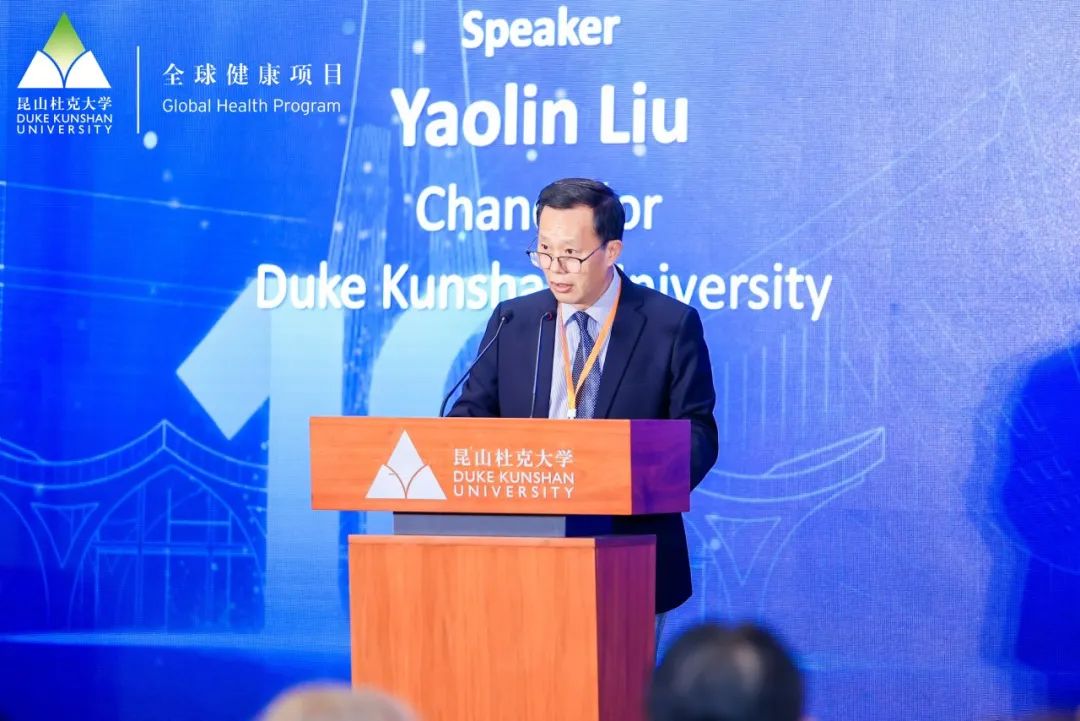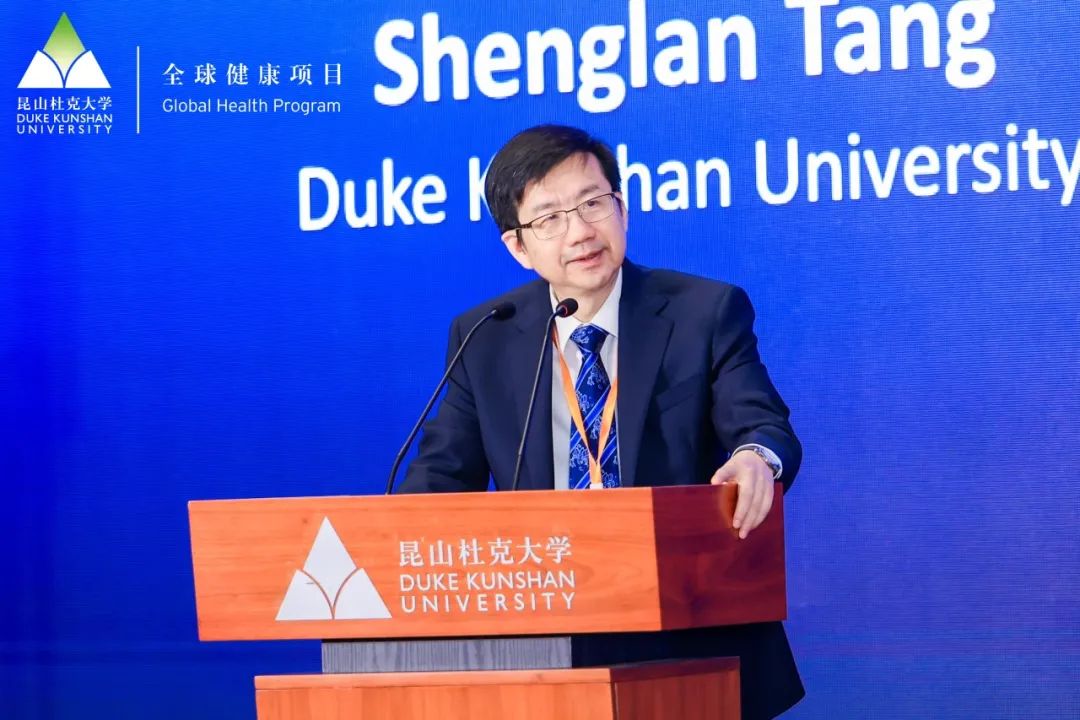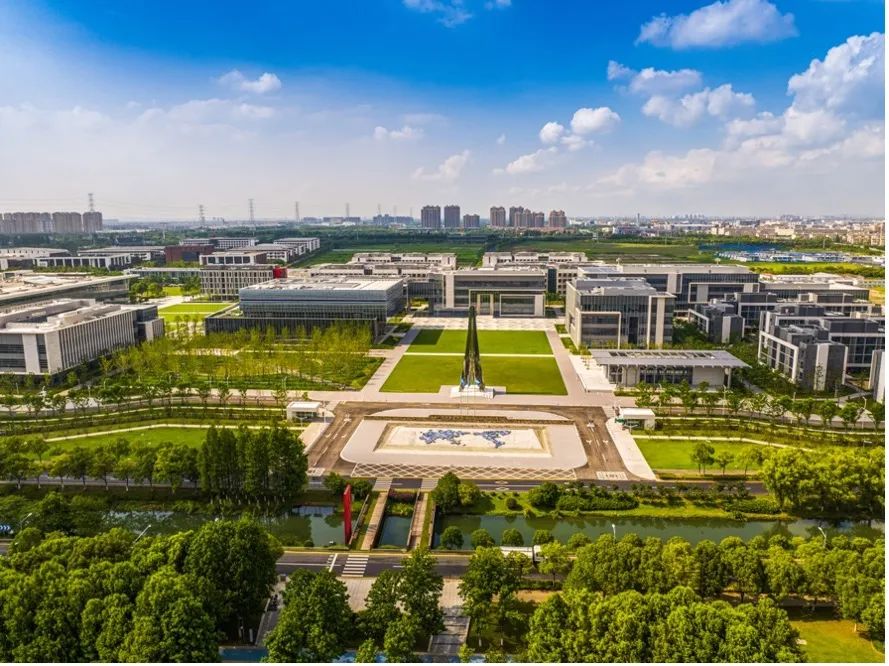The Duke Kunshan University Global Health Program hosted an international forum bringing together some of the most influential organizations in the field to advance key goals such as improving access to quality healthcare.
More than 200 distinguished guests from over 20 countries including the United States, United Kingdom, Australia, Egypt, Thailand, Laos and Cambodia participated in the forum, themed “Developing Sustainable Universal Health Coverage in the Era of Achieving Health Related Sustainable Development Goals by 2030” and marking the 10th anniversary of the DKU Global Health Research Center (GHRC).
They represented international and domestic organizations, universities and government institutions such as the World Health Organization (WHO), World Bank, Asian Infrastructure Investment Bank, Bill & Melinda Gates Foundation, Chinese Consortium of Universities for Global Health, and Jiangsu Provincial Health Commission.

Welcoming the guests in his opening speech to the Oct. 27-28 forum, Chancellor of Duke Kunshan Dr. Yaolin Liu said, “As the first research center established by DKU, the Global Health Research Center has over the past decade been dedicated to applying knowledge to serve the public good.
“It has achieved excellent results in research, talent development and the popularization of scientific knowledge.
“On the occasion of the 10th anniversary of DKU and the Global Health Research Center, we will continue to strengthen research and collaboration in the key areas of global health, environment and climate change, education, and digital innovation, contributing to the common well-being for all.”
GHRC was jointly founded in 2013 by Duke Kunshan University and the Duke Global Health Institute.
In recognition of its outstanding research achievements in global health and related fields, DKU has ranked in the top 1% globally in the clinical medicine discipline of the Essential Science Indicators (ESI) list for five consecutive years since 2018, with its ranking steadily improving year by year.

Dr. Shenglan Tang, the founding director of GHRC, remarked in his speech, “Over the past decade, there have been many milestone changes in China’s healthcare sector.
“We have witnessed the introduction of the ‘Healthy China 2030’ blueprint and achieved healthcare coverage for over 95% of the population.
“However, challenges remain amid the changing economic picture. Through this global health symposium, we hope to promote dialogues among researchers, policymakers and practitioners from different countries, regions and professional backgrounds.
“By exchanging best practices and mutual learning, we aim to explore innovative solutions to the increasingly complex global health challenges we face today.”
In his speech, Dr. Yunguo Liu, GHRC co-director, said, “Since its establishment, the Global Health Research Center has been dedicated to its mission of promoting health equity and improving health for all in China and worldwide.
“We have actively engaged in a number of domestic and international health research projects, with a focus on talent development, scientific research, knowledge translation and partnerships.
“In the post-pandemic era, global health collaboration is more crucial than ever. We need to strengthen health security, build more resilient healthcare and enhance social support systems.”

Participants of the forum shared lessons and practices from their respective fields and countries on the challenges of improving universal health coverage.
They covered topics including innovation and knowledge translation, health system reform and financing, strengthening primary healthcare, chronic non-communicable diseases prevention and control, improving access to essential medicines and vaccines, expanding service coverage for women, children and vulnerable populations, and healthy aging.
The WHO and World Bank on Sept. 18 jointly published the 2023 Universal Health Coverage (UHC) Global Monitoring Report.
The 2023 report indicates that since the year 2000, only 42 out of 138 countries globally have seen an improvement in their service coverage index (SCI) score, a measure of universal health coverage. Ninety-six countries are off-track in at least one indicator.
The report also reveals a stagnation in progress toward providing people everywhere with quality, affordable and accessible health care, especially in recent years. In 2021, about 4.5 billion people, more than half of the global population, were not fully covered by essential health services.
Impoverishing out-of-pocket health spending, where outlays on health exceed 10% of household budgets, continues to rise, with a widening impact among the population at the relative poverty line.
The report indicators show China’s remarkable progress in the SCI for universal health coverage.
Its score has steadily increased from 47 in 2000 and has been consistently maintained above 80 since 2019 to achieve the target for service coverage.
In specific sub-indicators, China has achieved comprehensive compliance in indicators related to women’s reproductive, maternal, newborn, child health (RMNCH), as well as in indicators of health service capacity and access.
However, challenges persist in non-communicable disease prevention and control, as well as the burden of healthcare expenditure.

Going forward, the GHRC will focus on five major research directions: health policy and systems; environmental health; chronic non-communicable diseases; emerging infectious diseases; and healthy aging.
In 2022, the Global Health Program expanded its research to three domains and nine priority areas: health system and policy (primary health care, health economics, and health informatics and data science); population health and well-being (maternal and child health, healthy aging, and non-communicable diseases); and health security and environment (infectious diseases, environmental health and health security).
The Global Health Research Center has received research funding from international and domestic institutions such as the WHO, Bill & Melinda Gates Foundation, National Institutes of Health in the United States, Medical Research Council in the United Kingdom, and National Natural Science Foundation of China.
The center has also edited and published 17 monographs and reports, and published over 500 high-quality academic papers in leading international academic journals such as The Lancet and JAMA.
In 2014, GHRC was selected by the Asia Pacific Observatory of the World Health Organization as the research hub for health policy and system research. By 2022, the observatory submitted six study reports and six policy briefs, all of which have been published by the WHO.
Founded by Duke University, Wuhan University and Kunshan Municipal Government, Duke Kunshan was formally approved by China’s Ministry of Education in September 2013. As a high-level Sino-U.S. partnership university, DKU is committed to integrating the best traditions and practices of countries and regions around the globe, and promoting cross-cultural communication, collaborative innovation and cross-country cooperation. DKU aims to develop a world-class liberal arts university based in China, and to help students from all over the world pursue meaningful and fulfilling lives.
Highlights from Guest Speakers
“Countries around the globe, as well as in Asia, face significant challenges when moving toward universal health coverage. Factors such as climate change, aging populations, the burden of chronic diseases, and health emergencies will all impact this process. To achieve universal health coverage, we need to establish clear plans, efficient healthcare systems, robust primary healthcare systems, and increase investment in the health sector.”
Dr. Erik Berglof
Chief Economist, Asian Infrastructure Investment Bank
“Countries in the Western Pacific Region have made significant gains in service coverage, but still face significant challenges in funding healthcare expenditures. In the post-pandemic era, countries need to revisit and reassess their capacity, emphasize inputs for program management and implementation, strengthen primary health care systems, and make every effort to improve essential public health services.”
Dr. Anne Mills
Professor of Health Economics and Policy, London School of Hygiene & Tropical Medicine
“Globally, population aging is a major challenge to universal health coverage. Countries should consider how to embed elderly care into primary health services and apply a comprehensive integration model of medical and elderly care services.”
Dr. Feng Zhao
World Bank Practice Manager for South Asia Region – Health, Nutrition and Population
“Countries in Africa have made impressive progress towards universal health coverage. However, due to a lower starting point, African countries, with the exception of South Africa and Algeria, are still below the global average with an SCI index score of less than 30. Countries will benefit from comprehensive analysis of their situation to take effective measures for improving health service coverage.”
Dr. Osondu Ogbuoji
Assistant Research Professor at Duke Global Health Institute
“Artificial intelligence (AI) will bring disruptive changes to all areas in healthcare. In the future, AI technology will be used in health workforce training, which is expected to go through three stages: AI-assisted, AI-converged, and AI-disruptive, making revolutionary change to our current training model.”
Dr. Wong Tien Yin
Vice Provost, Tsinghua University; Chair Professor & Founding Head, Tsinghua Medicine
“Health data is playing an increasingly important role in the country-level policy-making. In many countries, the health information systems need to be improved to enhance data quality and help make informed decisions.”
Dr. Nima Asgari-Jirhandeh
Director of the Asia Pacific Observatory on Health Systems and Policies of the WHO
“China shall focus on the sustainability, equity and risk protection of its publicly funded basic medical insurance to further enhance the country’s health insurance coverage.”
Dr. Qunhong Wu
Dean of the School of Health Management, Harbin Medical University; Changjing Scholar named by China’s Ministry of Education
“Artificial intelligence (AI) technology now plays an important role in achieving universal health coverage. However, we should also note that AI may also exacerbate health inequities due to variances in accessibility and tech product performance. To ensure equity, we shall focus on improving access to technology and taking measures to reduce the potential bias in adopting tech products and data.”
Dr. Margaret Whitehead
Head of the Department of Public Health and Policy, University of Liverpool

